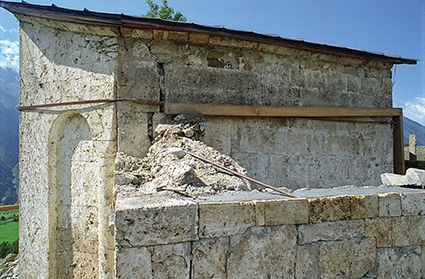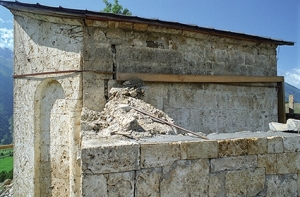The Service: Svaneti
We’ve had a guest/volunteer for a couple of weeks now, and she asked to see an Orthodox Sunday church service.
The first Sunday we remembered late; it starts at 10 am, and after barn duty it was past that. A week later locals suggested the main old church in the village, although they couldn’t be sure that it would be there, as there are several in Etseri and the priest had also started ministering in other nearby villages. We went, but no sign of life.
Third time... I now had the priest’s phone number, and was able to confirm that the event would indeed be in the church we had investigated earlier. We set off through the snow and mild winter currently gracing us.
The Pkhotreri Church of the Archangels was reputedly built (or ordered) by Queen Tamar, famous granddaughter of King David the Builder, on her legendary passage through Svaneti in the Middle Ages, scattering projects about her as she went all the way to Ushguli. It’s a unique structure- one church around a smaller one housing a few of the fabulous icons which were sent to inaccessible Svaneti many times for safekeeping during the frequent invasions. Our icons, though, are relatively battered, and perhaps thus have not been absorbed by the main museum housing such things, in Mestia.
The church interior is entirely frescoed with scenes from the lives of the Biblical and Georgian saints, although this work too has not fared well over the many centuries since it was done. Just a few figures and faces remain intact to watch you from wherever you are, eyes following. The exterior, however, was being renovated during one of my early visits here some fifteen years ago thanks to EU sponsorship. The soft, cream-colored stone is so worn in places, it looks like it might have grown, all veins.
To local outrage, the floor of the church was recently re-tiled in L-shaped stones—right material, but way too modernly done, apparently spoiling it to a great extent. There was, thankfully, a large electric heater in use, much needed as the place retains little warmth, doing its best but not making the place more than bearable.
The inner sanctuary’s steel door was locked but, hearing us approach, they opened it. Aside from the priest, there were only four acolytes—two of my grade 12 girls and two boys I didn’t recognize, all serving in various ways. Perhaps to get through things as fast as possible given the temperature, the whole sung liturgy was performed at auctioneering speed. It was a process of priest initiating and one girl answering, through prayers, Bible readings and other elements. The pace made it rather hard for me to interpret more than a general outline for my guest, but I tried to let her know the gist. If there had been more singers, we could have had a magnificent a cappella choir, but one was all we had. Where are you, devoted Svans?
Another sensory element supreme in Orthodox services and much too lacking elsewhere is smell. The smoke wafting from the censer is produced by incense made to the Old Testament recipe, and it will always mean the aroma of holiness to me, for my whole life from the moment I first inhaled it. I simply love the way it represents the prayers of the saints—including us, as St Paul calls all believers—going up before God’s throne.
The sermon, if there was one at all, was literally about two minutes long. Communion consisted of special bread but no wine; however, my guest and I were allowed to partake in the former. The priest, though, was not the one I had called but another, and we didn’t know each other. He admonished the boys to leave earthly thoughts in this place, and focus on the Divine. Most of the reading was done from the modern Georgian alphabet, but the Scriptures were read from a book printed in the old alphabet, completely different, although using modern language, an interesting combination which gave both male readers some trouble with its relative unfamiliarity. But they struggled on. Practice will do it.
About an hour and a half later it was over, and the priest swished off with the boys to his car and elsewhere. My guest and I said goodbye to the girls and trudged home ten minutes away. I wished that I’d understood more, but it’s a long learning process, especially with Georgian being sung that fast. I’m sure that God got every word, though.
Tony Hanmer runs the “Svaneti Renaissance” Facebook group, now with over 1250 members, at
www.facebook.com/groups/SvanetiRenaissance/
He and his wife also run their own guest house in Etseri:
www.facebook.com/hanmer.house.svaneti
Tony Hanmer












